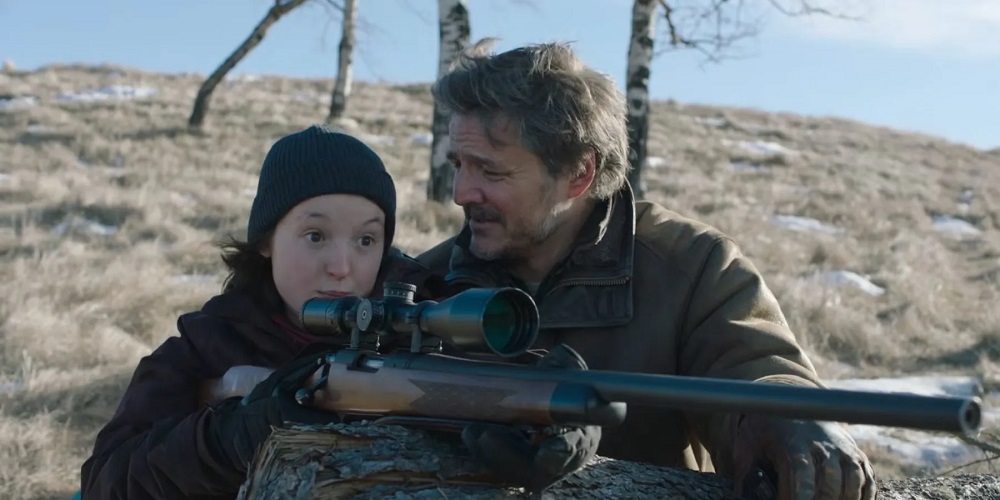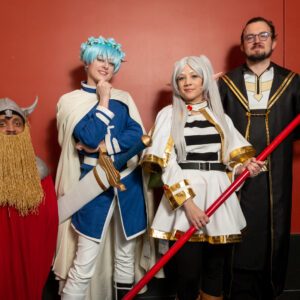It’s Time For The [Spoiler Redacted] Trope To Die

First, a spoiler warning is required. I will be spoiling Ep. 8 of the HBO Max series The Last Of Us. Oh, and I’ll also spoil the 2008 Neil Marshall near-future horror action flick Doomsday. You know, in case you haven’t seen it and want to without spoilers. But in the next paragraph, when I explain the trope that I want to get fixed or to retire, I have to spoil what is intended to be a shocking reveal in this latest episode of The Last Of Us.
So, below the break I will lay out the reasons why this latest episode of The Last Of Us HBO adaptation of the video game, and the older rip-off of 28 Days Later, both state that people in the story are forced to resort to cannibalism, when it is clearly a choice they make in the face of many better options.
Let’s start with the older example, the movie Doomsday. Brief plot synopsis: in 2008 the Reaper virus strikes Scotland, turning people into rage zombies. In response, the UK government builds a new Hadrian’s Wall, huge and modern, to keep the virus-filled rage zombies contained. In 2035, the virus suddenly appears in London, and at the same time, it seems like there are people living rage-free in Glasgow, so a team of scientists and soldiers is sent to see if there is a cure. In Glasgow they encounter a pretty large population of people who have become cannibals, apparently because of the forced isolation.
The movie Doomsday is the first time I recall watching something which tried to make out that people had no choice but to become cannibals, when the story itself shows there is absolutely no reason for them to be “forced” into that choice.
As the team from London (lead by Rhona Mitra in one of her first tough-gal action roles, and with the always solid Sean Pertwee) drives their armored personnel carrier-cum-military RV past the wall and toward Glasgow, not far from the city they encounter a herd of now-wild cattle so massive it blocks their path on the highway. Yes, literally just miles down the road from Glasgow is enough beef on the hoof to feed the hundreds of virus survivors for decades.
And that is ignoring all of the other food options — fish from the River Clyde or from the lakes and ponds in the northeast suburbs of Glasgow, or even a completely vegan option, since the Reaper virus apparently doesn’t prevent vegetables from growing. There are so many food options right at the literal doorsteps of the Glasgow survivors that eating humans is shown to be (even while the movie tries to tell us it’s not) a clear choice they made.
Now, I’m not trying to say there isn’t such a thing as forced cannibalism. If your soccer team’s plane crashes into the high Andes mountains, well above the tree line, and you have exhausted all of the meager food supplies on the plane, then it is realistic to believe you remaining survivors would be forced to eat your dead and frozen teammates. But that is a true story, and one set where there isn’t much possibility of dramatic conflict with other groups of people. Unlike our next example, Ep. 8 of The Last Of Us.
First, I love this series. It is possibly the best ever adaptation of one type of entertainment into another. But that doesn’t mean I can’t criticize it for its few problems. And warning, real spoilers ahead.
In Ep. 8, Ellie is nursing a wounded Joel and encounters a group of survivors, living in a nearby resort community called Silver Lake, being led by a Christian cult leader named David. Ellie gets captured by them, and while she is imprisoned, discovers that they have resorted to cannibalism, ostensibly because of a very harsh winter reducing their options for hunting game. The resort isn’t far from the fictional University of Eastern Colorado, where Ellie and Joel encountered men from David’s group, one of whom wounded Joel. Neither the game nor the series makes it clear what city the university is in, but a wiki assumes it is Boulder. My guess is that it is Fort Collins, since Tommy tells Joel to travel southeast from Jackson, Wyoming, until he hits I-25, then it is a straight shot south and “you can’t miss it.” They would reach Fort Collins along that highway before Boulder. But either way, both have lakes around them, which makes either metro area a good location for the lakeside resort of Silver Lake.
And that gets to the first food source David and his group completely ignore. There’s a lake. It is a water-focused recreational resort, as evidenced by the boathouse Joel breaks into, which is loaded with racks of canoes and kayaks. So it is safe to assume that a significant minority of the resort households have fishing gear. And despite it allegedly being a very harsh winter, the lake isn’t frozen — not that that would stop them from fishing through the ice. Sure, catching fish is tougher in the winter than the summer, but not impossible, or even that difficult. I grew up in Maine and participated in ice fishing derbies in which we had to drill through up to two feet of ice. Every kid in most of those derbies caught at least one fish, most more than one.
Then there is the claim that big game is sparse because of the same harsh winter. I’ve only been to Colorado once, in the spring of 1999 setting up the network for a new publication. While I was there Colorado got hit with a snowstorm. Not much accumulation in Denver where I was, but the relatively new Denver airport got shut down for its first time, because it got hit with more than three feet of snow. The next day the publisher took a break and took me on a tour of the mountains just west of Denver — Red Rocks, the town of Evergreen, all sorts of cool locations. And the elk were everywhere. For those of us on the East Coast, I’m talking everywhere like the Canadian geese on business park lawns kind of everywhere. This, in 1999, when the greater Denver metro area had a population of just under 2 million people. Imagine how many elk there would be if the population was at best a few hundred or a few thousand.
Any winter harsh enough to reduce the elk population in the foothills of the Rocky Mountains to less than squirrel levels would have long ago killed any humans. David and his group are cannibals by choice, not circumstances, given the wide availability of so many other options.
All I am asking is for writers to either retire this tired trope or make it believable if they use it. The writers of The Last Of Us simply needed to have a line where David explained they were all on the verge of starvation because of the long trek from Pittsburgh and didn’t have the energy for the challenges of food gathering in a harsh winter. Or they were very low on ammo and the resort had been picked clean of food and ammo by raiders before they got there. But based on what they showed us in the episode, they had plenty of energy to scavenge at the university many miles away, and to hunt with clearly no concern for ammo restrictions.
Please do better, writers. Cannibals that have been outed as choosing to eat people even in the face of other options would be so much more frightening than trying to make them somehow sympathetic because they were forced into cannibalism due to circumstances.
If you like our work and want to show your appreciation, feel free to tip us at Ko-fi or become a patron on Patreon.



